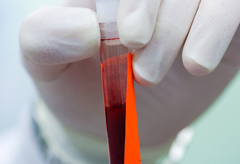New blood test to improve cancer diagnosis
A simple blood test could greatly improve cancer diagnosis as a result of clinical trials.

A simple blood test could greatly improve cancer diagnosis as a result of clinical trials.
A test, which is designed to isolate a single cancer cell among a billion healthy cells, could be used as a less invasive alternative to procedures such as mammograms, colonoscopies and painful tissue samples.
Using a microchip covered with 78,000 tiny posts coated in antibodies, which bind to tumour cells, the test could detect cancer at an earlier stage, providing more options for treatment and increasing the chances of survival.
‘There’s a lot of potential here and that’s why there’s a lot of excitement,' says Dr Mark Kris, of Memorial Sloan-Kettering Cancer Center in New York.
The new test could also recognize whether a certain tumour treatment was working or not much earlier than previous indicators, allowing more time to try alternative treatments.
‘If you could say quickly, "This drug is working" or "This drug is not working, try something else", that would be huge,’ says Dr Daniel Haber, chief of Massachusetts General Hospital’s cancer centre and one of the test’s inventors.
Cancer Research UK’s science information manager, Dr Kat Arney claims: ‘This test looks promising, but we need to see the results of large scale clinical trials to prove how helpful and practical it would be for general use’.
Celebrity news, beauty, fashion advice, and fascinating features, delivered straight to your inbox!